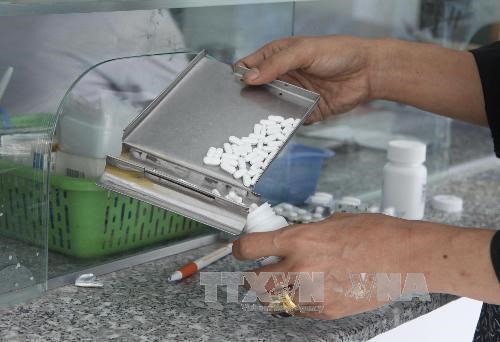 Society
Society

HCM City health centres that provide treatment to patients with HIV/AIDS should merge by the end of the year with district-level hospitals if the centres are unable to expand services to upgrade into general health clinics, which offer various kinds of treatment to all patients, a city official has said.
 |
| Patients with HIV/AIDS are provided with ARV drugs at a health facility in HCM City. — VNA/VNS Photo Phương Vy |
HCM CITY – HCM City health centres that provide treatment to patients with HIV/AIDS should merge by the end of the year with district-level hospitals if the centres are unable to expand services to upgrade into general health clinics, which offer various kinds of treatment to all patients, a city official has said.
Twenty-one of the city’s 24 health centres (formerly known as preventive health centres) offer treatment for HIV/AIDS patients and preventive health services.
Many of these centres, however, have not signed contracts with the Việt Nam Social Security agency, and thus, patients with HIV/AIDS, even those with health insurance cards, cannot be insured.
Dr Tiêu Thị Thu Vân, head of the city’s Centre for HIV/AIDS Prevention, at a meeting between the department and its health centres held this week, said that the centres which lack conditions to upgrade to a general health clinic should merge with district-level hospitals to ensure continuity of treatment for HIV/AIDS patients as well as health insurance coverage.
“If patients with HIV/AIDS stop using anti-retroviral (ARV) medicine for one week, they will become resistant to the medicine, leading to a problem of epidemic control in the city,” Vân said.
The cost for treatment for patients who are resistant to the drug would not be covered by insurance, Vân said, adding that the cost is five to 10 times higher than the usual treatment given before drug-resistance.
International aid to Việt Nam that covers the costs of ARV drugs is gradually being reduced and will completely end by 2020, Vân said.
At the beginning of the year, state insurance funds will start covering costs for ARV drugs.
If health centres are able to upgrade to general clinics, they could then sign contracts for insured examinations and drug treatment with the Việt Nam Social Security agency.
If the health centres merge with district-level hospitals, they would transfer their patients with HIV/AIDS to the hospital to receive ARV medicine and other treatment covered by health insurance, according to Vân.
Health insurance cards
“Of the surveyed 28,000 patients with HIV/AIDS in the city, 72 per cent have health insurance cards,” Vân said.
The city People’s Committee has approved purchase of health insurance cards for all patients with HIV/AIDS who have HCM City household registration books or temporary resident status for six months, she added.
At least 90 per cent of insured patients with HIV/AIDS do not use their health cards as most of the facilities where they go for treatment have no contracts with Việt Nam Social Security.
By December, the Ministry of Health will provide ARV drugs to the city’s Hospital for Tropical Diseases, Phạm Ngọc Thạch Hospital, District 1 Hospital, Tân Phú District Hospital, Thủ Đức District Hospital and health centres in the districts of Tân Phú, Thủ Đức and Bình Chánh that have the capacity to upgrade to general health clinics.
According to a report from the city’s Centre for HIV/AIDS Prevention, the city as of July had 31,000 patients with HIV/AIDS receiving ARV treatment at 31 health facilities. — VNS




